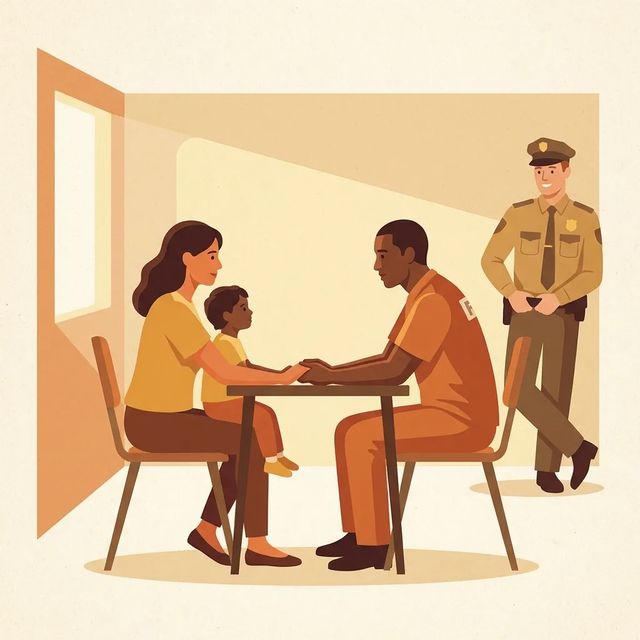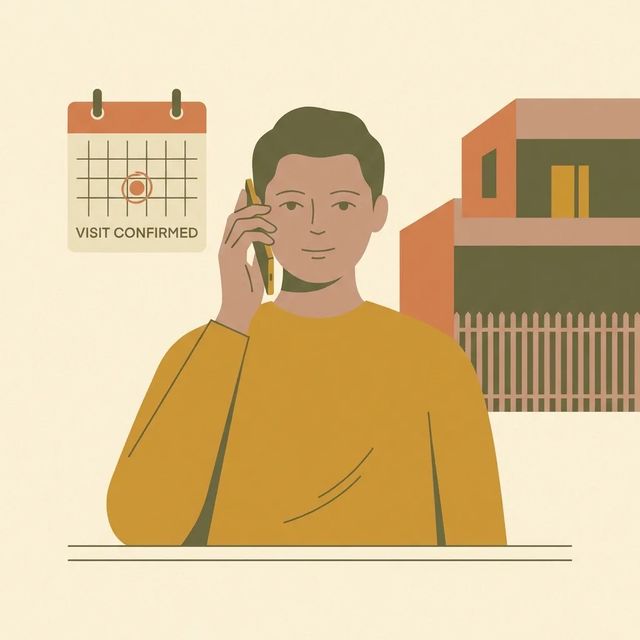Robert Presley Detention Center
Explore
Find an Inmate at Robert Presley Detention Center
Search for a loved one and send messages and photos in minutes.

Guides for This Facility

How to Contact an Inmate at Robert Presley Detention Center (CA)
Trying to stay in touch with someone at Robert Presley Detention Center? Visiting is usually the fastest way to connect. Here are the facility-specific rules and the phone number you need to schedule a visit.
Read Guide
How to Schedule a Visit at Robert Presley Detention Center
Visiting someone at Robert Presley Detention Center comes down to timing and a little prep work. Here's how to get on the schedule and what to expect when you arrive.
Read Guide
4 Ways to Put Money on an Inmate's Account at Robert Presley (kiosk, phone, online, mail)
Trying to get money onto someone's account at Robert Presley Detention Center? You have four options: the lobby kiosk, phone, online, or mailing a U.S. Postal Service money order.
Read GuideAt a Glance
Visitation
- Call the facility’s visiting number during 9 a.m.–5 p.m. to schedule a visit.
- The jail allows a maximum of two visits per week per inmate, with each visit about 45 minutes long.
- Only two visitors per inmate are permitted at a time under current physical-distancing rules.
Communication
- To schedule a visit at Robert Presley Detention Center, call the facility visiting line during 9 a.m.–5 p.m.
- County guidance directs callers to schedule visits one day before the desired date.
- You can deposit funds by phone through Access Corrections at 1-866-345-1884; agents are available 24/7 and bilingual.
Sending Money
- Robert Presley accepts deposits four ways: Access Corrections online, phone deposits, lobby/kiosk, or U.S. Postal money order.
- To deposit by phone call Access Corrections at 1-866-345-1884; agents are available 24/7 and bilingual.
- Presley’s lobby kiosks operate 24 hours daily and accept cash or credit but cannot make change and will not accept bills smaller than $5.00.
Based on official sources and community feedback. Learn how we verify
Topic Overviews
Visitation
Visiting someone at Robert Presley Detention Center takes a little planning, but the rules are straightforward. Call the facility's visiting number between 9 a.m. and 5 p.m. to book, and schedule at least one day ahead. Under current physical-distancing rules, only two visitors per inmate are allowed at a time. Each inmate can have up to two visits per week, with each visit running about 45 minutes. Bring a valid government-issued photo ID. Expect search procedures, and note that visitors under 18 have separate rules about accompaniment. Visits can be ended for security reasons, and leaving the visitation area ends your visit immediately.
Read full guideCommunication
Communication at Robert Presley Detention Center includes phone-based visit scheduling, plus options like audio calls, video visits, and electronic messaging when available. To schedule an in-person visit, call the facility visiting number between 9 a.m. and 5 p.m. County guidance recommends booking one day before the date you want. Need to add funds by phone? Access Corrections takes deposits at 1-866-345-1884 with 24/7 bilingual support. For video visits or electronic messaging, create an account on the department communications platform (web or mobile) and add prepaid funds. During vendor transitions, follow the platform the facility currently supports.
Read full guideSending Money
Robert Presley Detention Center accepts inmate deposits four ways: Access Corrections online, by phone, at a 24-hour lobby kiosk, or by U.S. Postal money order. Funds go toward commissary items like snacks, hygiene products, phone cards, and writing materials. To deposit by phone, call Access Corrections at 1-866-345-1884. Agents are available 24/7 and bilingual. The lobby kiosks operate around the clock and take cash or credit, but they cannot make change and won't accept bills smaller than $5.00. Mailing a money order? Include the inmate's name and booking number. Cash and personal checks are not accepted. Money left after release can be claimed through the Sheriff's Unclaimed Money website.
Read full guideCommon Questions
Showing 6 of 9How many visits can an inmate have each week at Robert Presley Detention Center?
Inmates are allowed a maximum of two visits per week at Robert Presley Detention Center.
VisitationHow long does each visit last at Robert Presley Detention Center?
Each visit is approximately 45 minutes long.
VisitationHow many people can visit an inmate at one time at Robert Presley Detention Center?
Only two visitors per inmate are allowed at one time under the current physical-distancing rules.
VisitationHow do I schedule a visit at Robert Presley Detention Center?
Call the facility visiting line between 9 a.m. and 5 p.m. County guidance recommends scheduling your visit one day before the date you want.
CommunicationCan I add money to an inmate account by phone?
Yes. You can deposit funds by phone through Access Corrections at 1-866-345-1884. The phone line is available 24/7 and offers bilingual assistance.
CommunicationHow do I set up video visits or electronic messaging?
Create an account on the department communications platform (web or mobile), then register for video or messaging if available. Add prepaid funds in the app. During vendor transitions, use whichever platform the facility currently supports.
CommunicationMore Guides
Ready to Connect?
Search for your loved one to start communicating today
Did You Know?
This page covers Robert Presley Detention Center in California. To schedule a visit, call the listed number between 9 a.m. and 5 p.m.
This guide is based on feedback from 75 families and official facility documentation. Learn how we verify
